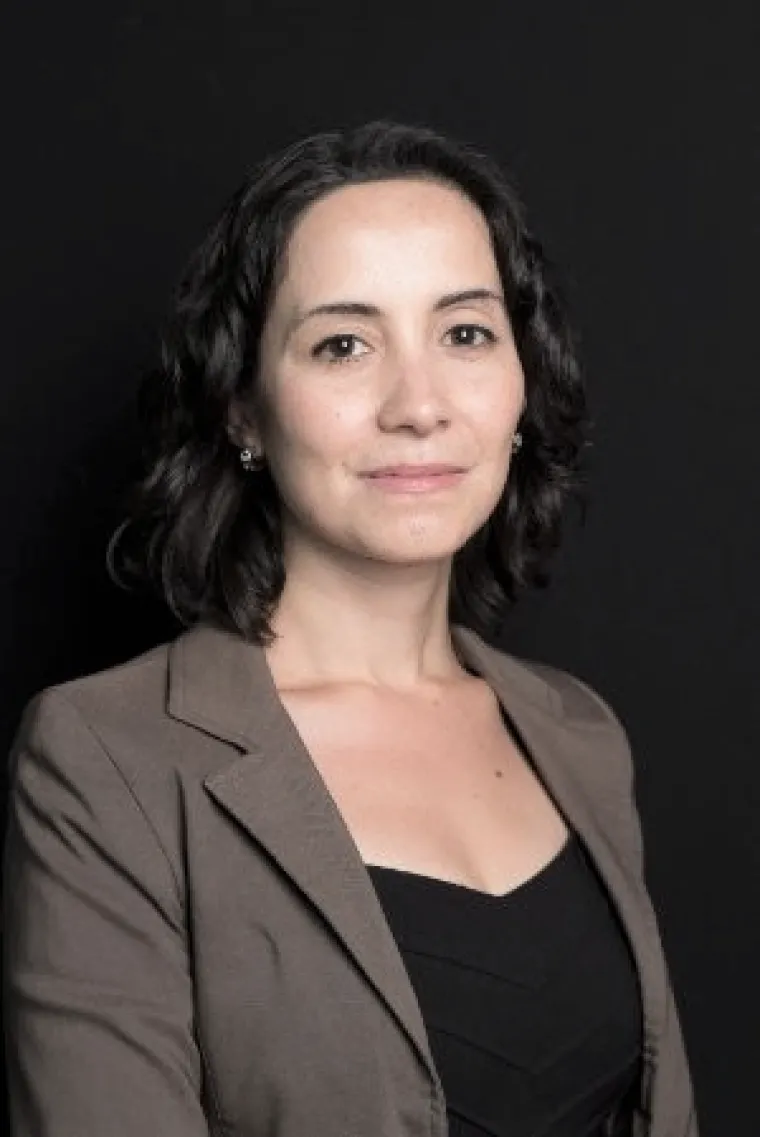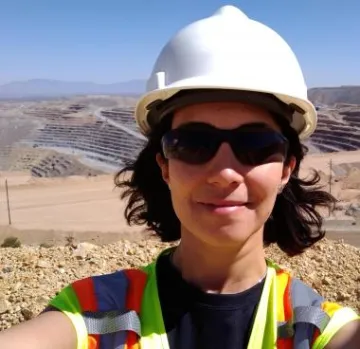Nathalie Risso

Bringing cyber systems into mining
Growing up in Chile, the world’s leading producer of copper, Nathalie Risso had dreamt of becoming an engineer since she was a little girl. Now, after earning a number of diplomas and putting in some hard work in the industry, she’s thrilled to be back in Tucson as an Assistant Professor in the Department of Mining & Geological Engineering.
“I’m actually from a small town in Chile that only has four streets,” Risso says. “I did my undergraduate in Chile in electronics engineering and then I came here to the University of Arizona to get my PhD in electrical and computer engineering.” While deeply immersed in research for her doctorate, Risso claims she got “a little ambitious,” and decided not only to enroll in a handful of mining classes, but also to complete a master’s program in renewable energy. Chile is renowned for its presence in the mining industry, so she was already familiar with the community and had no trouble falling in love with the field.
In fact, Risso enjoyed the mining aspect of her studies so much that she chose to stay in Tucson for a few more years to earn a master’s degree in mining engineering before returning to Chile in 2019 for a job in mining construction. But, when the opportunity arose to come back to the sunny desert state, she didn’t hesitate. “Tucson is surrounded by all these mines and mining companies, and you also have a lot of technology available. Many of the companies that are here—Caterpillar, Komatsu—I worked with before, in Chile. There, they’re just implementing things that are already done,” Risso says. “Here, they are trying new things and that seemed really exciting.”
Risso believes that a very strong community and strong connections with other mining countries like Canada, Chile, Peru, and Australia make UArizona a unique place to do research. “It’s a very good environment for mining to grow and become what I believe it should be, which is sustainable and technologically efficient,” she says.
Searching for the Sustainable Path
Unsurprisingly, as a master of multitasking, Risso is always working on many things at once, from investigating issues in mining engineering to teaching classes and inspiring youth (especially women) to love science. In Chile, she created two separate university groups to jumpstart and encourage more women to join various scientific fields. She currently maintains three major lines of research, the first being in cyber-physical systems.
Cyber-physical systems (CPS) are a blend of computation and the physical world, usually found in situations that require technology to work with the natural world while adhering to the laws of physics. For example, a CPS could be a human who carries a chip measuring something in the human, like heart rate or blood oxygen levels. These systems have many applications, but they’re starting to make bigger waves in mining, and Risso is at the forefront of that wave.
“We are looking into how we can use these devices and integrate them into underground mines to collect valuable information,” Risso says. “Maybe, we can monitor peoples’ health so we can know if they’re working in a good environment.”
Another facet of Risso’s work focuses on improving the efficiency of machine learning. The mining industry, just like every industry now, is gathering a lot of information. Sensors, machines, and all manner of technology are all collecting some sort of data. However, the massive amount of data we collect is not always doing something useful. “I’m looking to collect information from CPS and all our resources in mining to try to come up with models that will allow us to better understand the mining and mineral processing world,” Risso says. “That way, we’ll be able to develop controllers that are more efficient and that can do things like reduce energy consumption and guarantee safety.”
Risso’s third branch of research has to do with sustainability and renewable resources. “Mining is also very related to sustainability, and that’s the big lesson I learned from coming to UArizona and the mining department,” she says. She’s applying the idea of CPS to renewable energy to show that electric equipment being charged with renewable resources can be more efficient and have better impacts on the environment than their non-renewable counterparts. Risso says that projects we’re doing today can affect the possibility of our children and our children’s children to use those resources. The hard part is finding an equilibrium where humans can take advantage of what’s surrounding us while minimizing our permanent footprint on the planet.
“Sustainability and mining go hand in hand. That is something I believe that technology can help with. We can show, through the use of technology and intelligent platforms, how polluting something really is, or maybe we can break some of those stereotypes that are in the industry,” Risso says. Using her combination of expertise, her goal is to use the technology we have available and are currently developing to make the mining industry better.
Technology on the Horizon

“If you think about the underground mines, right now, the content of minerals is getting lower and lower. So, we need to go deeper in the underground mines,” Risso says. “The environments are very dangerous for people to work in.”
Things like teleoperations and virtual reality environments for training, she explains, are definitely a necessity. We’re going to need that technology in the future, as we think about traveling in space, so Risso is adamant that digital communication is here to stay. On a smaller scale, Risso has embraced the online communications that have cropped up in other places, like in the classroom. With respect to the recent return to in-person education, she has enjoyed a sort of hybrid approach to teaching. “Some people prefer online training, but others need the in-person socialization that traditional education in the classroom can give you,” Risso says. “Those two perspectives don’t need to fight, rather they can complement each other.”
When asked what she’s most excited about, Risso’s enthusiasm was infectious. The answer, of course, was everything. Her wide-ranging interest make her an ideal collaborator with the new School of Mining and Mineral Resources, which was happy to support her onboarding. Risso defines an engineer as someone who works hard to use technology in ways that make peoples’ lives better, and she’s not shy about sharing that goal with everyone around her.
“I’m mostly very excited to connect with people, especially the students. I’m also very excited about doing research and collaborating with different people around the world to do things that are really unique and inspiring,” Risso says. “I want the students to be able to look at us and really see that we are adding value here, and for them to be happy to be at this University.”

